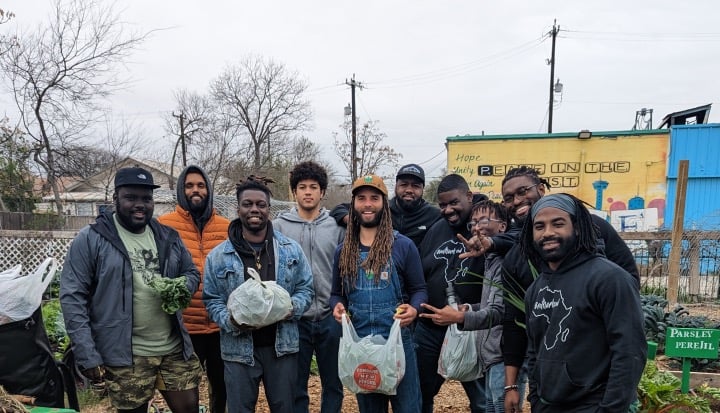How might philanthropy shift if we framed Black economic mobility as an inherent right and a collective responsibility? Might we, as funders, abandon “risk” terminology to automatically recognize Black, African, and diaspora founders’ expertise and authority? Might we trust Black and diaspora leaders’ advocacy of their communities’ real needs, widely supporting proximate leaders to author their own, meaningful measures of success and progress? This year’s Black Philanthropy Month theme – Afro-futurism – calls funders to pose precisely these kinds of questions, disrupt long-standing power imbalances, and instead “envision liberated futures for Black life” alongside the Afro-futurist innovators who already know what we should build next.
The prompt is all-too-timely. Though we collectively witnessed a groundswell of support for racial equity after the global protest movements of 2020, that fervor – particularly among funders – has waned. Though $16.8 billion were promised since 2020, only between $3.4-$4.2 billion were actually granted to racial justice and racial equity initiatives in the United States—with more than a third of the top 20 racial equity recipients being organizations “founded by white billionaires or large corporations advancing their own theories of change in mostly Black and Brown communities, often independent of or in direct opposition to calls from racial justice movement leaders.” The combination of already-waning funder support with newly reactionary funder fear of legal attacks on the fairness of acknowledging and righting historical and ongoing exclusion of Black, Brown, and Indigenous communities only magnifies this trend. Now, perhaps more impactful than the zeitgeist decisions of 2020-2022, funders and intermediaries must choose where to focus our energy.
Funders play a critical role in cultivating liberated futures through principled giving practices. Multiple thought leaders—most notably Edgar Villanueva of the Decolonizing Wealth Project and Liberated Capital—describe such liberatory funding practices with three separate but related approaches. First, confront and dismantle underlying interpersonal and systemic biases to best support futurist innovators. Second, redefine risk to better facilitate transformative change. Finally, actively cede power to prioritize the uniquely-effective expertise that comes from proximity to an issue.
Confront and Dismantle Biases: Funder bias can live in seemingly ‘objective’ spaces like metrics and evaluation. But funding anchored in Afro-futurist work would disrupt biased approaches to defining measures of success. In Echoing Green’s recent research, fifty-seven percent of Black, Indigenous and people of color (BIPOC) social innovators reported insufficient time to demonstrate impact because of unrealistic expectations set against short grant terms. Another fifty-two percent indicated having to report on misaligned metrics that do not accurately reflect their organization’s work. Ultimately, bias for or against BIPOC leaders’ judgment determines whose solutions guide the design of grant terms – funders’ or leaders’ themselves.
Redefine Risk: Liberatory funding approaches produce spaciousness and freedom for innovation, ideas, failure, and deep investment, weakening an often bias-driven system that magnifies funders’ perception of “risky” Black, African, and African diaspora-led enterprises. For example, Wellthi, founded by Fonta Gilliam, is changing the way that women, immigrants, and millennials save and invest. Their game-changing Virtual Advisor Technology app empowers its users to reach their goals by harnessing the power of community in a safe, convenient, and transparent manner. Although Gilliam had received seed funding, investors declined to support the organization further. It took liberatory funding approaches from aligned investors to scale the app for widespread use.
Actively Redistribute/Cede Power to Proximate Leaders: Afro-futurist leaders urgently and authentically envision a comprehensively just society to support Black bodies, minds, and the Black collective. For example, Black Outside, founded by Alexander Bailey, nurtures holistic mental health and wellbeing for Black youth in Texas. The organization transforms outdoor spaces into safe and equitable backdrops for Black joy and liberation through culturally relevant and restorative outdoor experiences, (re)building ecological wellbeing practices in the Black community.
Wecyclers, founded by Bilikiss Adebiyi-Abiola, reduces the impact of poor waste management and local environmental degradation on low-income households in Nigeria by establishing accessible, incentive-based recycling systems. By building upon the experience of local communities, and drawing on neighbors’ aspirations to improve their local environment, Wecyclers strengthens the Black collective. Government and large philanthropic entities have taken note, supporting Wecyclers to scale positive benefits to other communities in Nigeria.
Fonta Gilliam, Alexander Bailey, and Bilikiss Adebiyi-Abiola have each benefitted from supportive funding partnerships who demonstrate liberatory practices – confronting funder biases, redefining risky giving, and shifting power directly to leaders. Across geography and issue area, Afro-futurist innovators continue authoring new solutions to intractable challenges. Similarly, across geography and issue area, funders that recognize innovators’ lived expertise can fuel future liberation. Black, African and African diaspora leaders are creating the blueprint for a reimagined future daily. Philanthropy, then, must listen.









